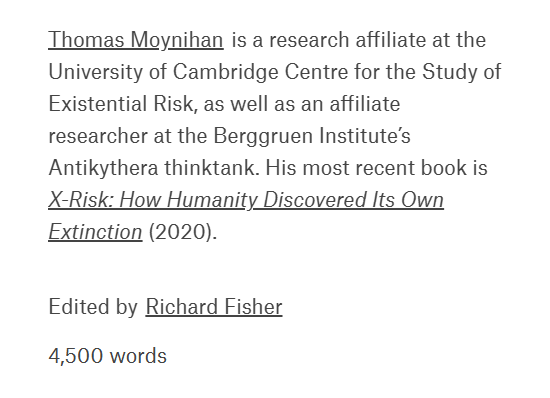The bookends of time
 Nothing lasts forever: not humanity, not Earth, not the Universe. But finitude confers an indelible meaning to our lives
https://aeon.co/essays/how-humanity-moved-from-eternal-to-bookended-time
Nothing lasts forever: not humanity, not Earth, not the Universe. But finitude confers an indelible meaning to our lives
https://aeon.co/essays/how-humanity-moved-from-eternal-to-bookended-time


Do you recall the first time you knew you would die? It’s a milestone, realising your time is limited. That things happened before you, and will happen afterward, in your absence. As we grow up, the understanding of death comes in stages, but it culminates in acknowledgment of one’s own – unavoidable yet unpredictable – mortality. Sometime between the ages of six and 10, children
become aware that their time is inescapably bounded.
Roughly the same might be said of humanity’s self-knowledge. Only recently has the human collective begun accepting the fact it is itself mortal. We now appreciate that events unfolded for aeons before us and that our species
can disappear, never to return. One day, the cosmos will persist without human witness, nor any inherent tendency to manifest things we cherish. The anti-war campaigner Jonathan Schell called this realisation the ‘second death’. Growing up, each of us comes to terms, psychologically, with a ‘first death’ – our own – but, beyond this, lurks the realisation that humankind itself hasn’t always existed and won’t be around forever.
For most of history, such understanding was lacking. People could defang – or outright deny – the possibility of beginnings and ends greater than those of our own biographies by appealing to eternity. Before we found evidence to prove otherwise, it was permissible to presume that, beyond tangible scales, time has no true bounds. For millennia, people have found comfort in this, because nothing dies in eternity. Given eternal time, every possibility – no matter how wildly improbable – will repeat and recur limitlessly. Outside our island of perceptible time – within eternity’s boundless ocean – it remained plausible to assume that all deceased things will eventually resurrect.
It’s now clear humanity lacks the luxury of eternity. We know this because evidence has accumulated to show that there are greater, even more encompassing mortalities than our own. We now understand Earth and its life had their origins and, one day, they will be cremated by our ageing Sun. A ‘third death’, then. Beyond that, even the Universe itself has its bounds: it began with a bang, and the consensus view is that, in the distant future, it will likely
have its end. Thus, a ‘fourth death’. Multiple grander mortalities, expanding concentrically outward.
snip


